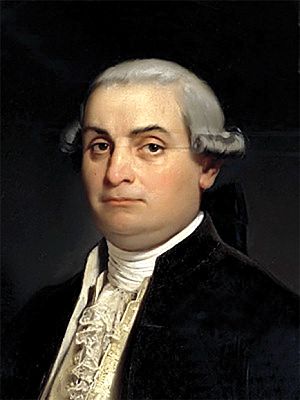Cesare Beccaria facts for kids
Quick facts for kids
Cesare Bonesana di Beccaria
|
|
|---|---|
 |
|
| Born | 15 March 1738 |
| Died | 28 November 1794 (aged 56) Milan, Duchy of Milan
|
| Nationality | Italian |
| Education | University of Pavia |
|
Notable work
|
On Crimes and Punishments (1764) |
| Spouse(s) | Teresa Blasco, Anna Barbò |
| Era | Age of Enlightenment |
| Region | Western philosophy
|
| School |
|
|
Main interests
|
Criminology |
|
Notable ideas
|
Penology |
|
Influences
|
|
|
Influenced
|
|
Cesare Bonesana di Beccaria (born March 15, 1738 – died November 28, 1794) was an important Italian thinker. He was a criminologist (someone who studies crime), a jurist (a legal expert), a philosopher, an economist, and a politician. Many people consider him one of the greatest minds of the Age of Enlightenment.
Beccaria is especially famous for his book On Crimes and Punishments, written in 1764. In this book, he spoke out against torture and the death penalty. His ideas helped create modern criminal law and the field of criminal justice. Many people see him as the "father" of these important areas. His work greatly influenced the Founding Fathers of the United States.
Early Life and Learning
Beccaria was born in Milan, Italy, on March 15, 1738. His family was aristocratic, meaning they belonged to a noble class. He first studied at a Jesuit college in Parma. Later, he earned a law degree from the University of Pavia in 1758.
At first, Beccaria was very good at mathematics. However, after reading the works of Montesquieu, his interest shifted. He began to focus on economics instead. In 1762, he published his first work. It was about problems with money in Milan and suggested ways to fix them.
In his mid-twenties, Beccaria became close friends with two brothers, Pietro and Alessandro Verri. They, along with other young men from Milan's noble families, formed a group called "L'Accademia dei pugni." This name, meaning "The Academy of Fists," was a playful jab at serious academic groups. Their discussions often focused on how to improve the justice system. Through this group, Beccaria learned about the ideas of French and British thinkers like Diderot, Helvétius, Montesquieu, and Hume. Helvétius was a particularly strong influence on him.
Later Life and Impact
Beccaria was invited to Paris to meet other famous thinkers of his time. He traveled with the Verri brothers and was welcomed by the philosophes (French Enlightenment thinkers). However, Beccaria was a very shy person. He did not make a strong impression and left after only three weeks. He returned to Milan and his wife, Teresa, and never traveled abroad again. This trip caused a lasting disagreement with the Verri brothers. They could not understand why Beccaria left at the peak of his success.
Even so, Beccaria continued to be recognized by officials. He was given several political positions in Italy. Without the help of his friends, he did not write another book as important as his first. Outside Italy, some people wrongly believed that Beccaria stopped writing because Austria limited free speech in Italy. In reality, he often felt sad and disliked people, which made him quiet.
Legal experts of the time praised Beccaria's book. Several European leaders promised to follow its ideas. Many changes in the laws of major European countries came from his book. However, few people at the time agreed with Beccaria's argument against the death penalty. Even when the Grand Duchy of Tuscany became the first nation to end the death penalty, they did so because they believed it was not useful, not because they thought the state had no right to execute people. In English-speaking countries, Beccaria's ideas influenced writers like Sir William Blackstone and Jeremy Bentham.
In November 1768, Beccaria was given a special job. He became a professor of law and economics at the Palatine College of Milan. His lessons on economics followed ideas that were similar to those of English economists. These lessons were later published. Beccaria never wrote another major work like Dei Delitti e Delle Pene, but he tried many times. Only a short book on writing style was published during his lifetime.
In 1771, Beccaria became a member of the supreme economic council. In 1791, he joined a group working to improve the legal system, where he made important contributions. During this time, he led several important changes, such as making weights and measurements the same across the region. He passed away in Milan.
Beccaria was a pioneer in the study of crime. His ideas helped shape the rights listed in the US Constitution and the Bill of Rights. His book On Crimes and Punishments was a helpful guide for the Founding Fathers of the United States.
Beccaria's theories from On Crimes and Punishments are still important today. Some current policies influenced by his ideas include "truth in sentencing" (making sure sentences are clear), swift punishment, and the ending of the death penalty in some U.S. states. While many of his ideas are popular, some are still debated, even more than two centuries after his death.
Family
Beccaria's grandson was Alessandro Manzoni. He was a famous Italian novelist and poet. Manzoni wrote The Betrothed, which was one of the first Italian historical novels. He also wrote "Il cinque maggio," a poem about Napoleon's death.
Commemorations
- Beccaria Township in central Pennsylvania, United States, is named for him.
- Piazza Beccaria, a large square in Florence, Italy, is also named for him.
See also
 In Spanish: Cesare Beccaria para niños
In Spanish: Cesare Beccaria para niños
- Capital punishment in Italy
 | Selma Burke |
 | Pauline Powell Burns |
 | Frederick J. Brown |
 | Robert Blackburn |

